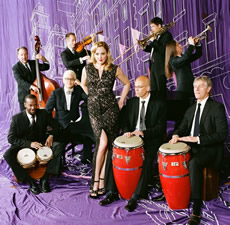In response to the inevitable question asked of the group Pink Martini as to “what kind of music do you play?” the best — and most accurate response — would be that of founder/leader/pianist Thomas Lauderdale: “Pink Martini is a rollicking around-the-world adventure…if the United Nations had a house band in 1962, hopefully we’d be that band.” Lauderdale, an aspiring politician in Portland, Oregon was dismayed at the banality of music played at political fundraisers and put his prodigious musical talents to use by forming a “little orchestra” to help attract sympathetic voters to rallies of mostly liberal causes. Well, here’s at least one positive outcome of politics.
Pink Martini first played with the North Carolina Symphony during the Summerfest series in Cary in 2005 when they were an up-and-coming group. Well, they have certainly arrived, and it’s difficult to imagine how much more “up” they can get since they appear all over the world, mostly with orchestras. The one big difference this time is the appearance of vocalist Storm Large (yes, that’s her name) temporarily replacing longtime singer China Forbes who is recovering from surgery on her vocal chords.
Billed as “Holiday Pops: A Pink Martini Christmas,” the North Carolina Symphony invested heavily by booking this group for three shows, and based on this sold-out show and the unusual appearance of entire families at Meymandi, it looks like it is a resounding success. Although labeled as a Christmas program, there was some very un-Christmas like selections including the opener: a raucous, Liberace-like arrangement of a Liszt Hungarian Rhapsody. Some other lowlights of the evening was a paint-by-numbers Brazilian-Japanese (!) “Midnight Bossa-Nova” and Ms. Large belting out a weirdly inappropriate and banal arrangement of the rat pack favorite “The Lady is a Tramp.” Luckily these missteps were few, and as the evening wore on and some special guests appeared, the holiday mood improved. It is not surprising that Ms. Large’s vocal style is very similar to that of China Forbes, and she has a relatively wide range.
The first Christmas standard was a interesting take on “The Little Drummer Boy.” This was done as a quasi version of Ravel’s Bolero as it started very softly with an insistent and perpetually repeated snare drum figure, gradually building in intensity and volume. We then met the first guest of the evening, a voice we heard many times, but never like this: NPR White House correspondent Ari Shapiro. This is no wannabe “gee he’s pretty good for a journalist” singer, but a fully realized professional in the same class as some Sinatra copiers like Michael Buble and Michael Feinstein. He had several duos with Storm and they were as elegant and classic together as Fred and Ginger. As surprising as Shapiro was, the next guest was equally inspiring. Longtime associate, and the person who hired Pink Martini to their first gig with the Oregon symphony in 1998, Norman Leyden has a long and impressive musical resume, and he is 95 years old. He bounded out on the stage, swinging his cane and holding his clarinet and proceeded to play like a musician in his prime. The audience ate it up and gave him a standing ovation.
Despite the nearly insufferable onslaught of Xmas music that sometimes begins in mid-November, many of these classics are harmonically and melodically rich treasures that inspire musicians, especially arrangers. For that reason the beginning of the second half of the concert was worth the price of admission. An interesting off-kilter, syncopated rhythm started off “We Three Kings” but that was the least of what was to come. The orchestra entered with a sweeping gesture that soon emerged as sections of Smetana’s The Moldau (Vltava) and the two fit perfectly! It was quite astounding, and a brilliant piece of arranging.
Since the holidays usually involve a good healthy dose of nostalgia, looking back at one of the most memorable musicals ever made would be enough, but we had the live descendants of the central characters of “The Sound of Music.” The Von Trapps, the singing four grandchildren of Maria and Georg Von Trapp came out and absolutely stole the show. They began with “Village Music,” an astounding display of yodeling. But, after all the bombastic arrangements, their a cappella performances of Brahms’ “In Stiller Nacht” was easily the most affecting and beautiful of the evening. The obligatory nod to the musical which made their family famous was wrapped up with “The Lonely Goatherd.”
The first encore was another example that small forces and simplicity can often outshine the big and complex. Their brilliant guitarist Dan Faehnle was the sole accompanist to Ms. Large singing “White Christmas,” in sharp contrast to the almost offensive intrusion by the orchestra at the end. Finally the evening ended with “To Brazil,” which has become the unofficial modern-day anthem of that country. Ms. Large invited the audience to join in for a “Christmas Conga line” and the night ended with many doing just that through the aisles of the state orchestra’s home venue.











